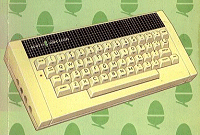ACORN ATOM
 |
Acorn's range of 8-bit machines include the Atom (on the picture), the BBC
models A, B and B+, the Electron, the BBC Master
and the Master Compact. Atom (1979) had 6502A/1 MHz CPU, 8 KB ROM (max. 16), 2 KB RAM (max. 12), 8 colors and 3 voices. A several peripherals were developped for it: e.q. 5,25" FDD or a network called EcoNet (this network allowed to link up to 250 Atoms). |
| EMULATORS | ||
|---|---|---|
| Atom Emulator 1.33 | Acorn Atom emulator for DOS (freeware) | Author's homepage |
| PROGRAM RESOURCES |
|---|
| Games on the author's page |
ACORN BBC
 |
The adventure started in 1981, when the British
Broadcasting Corporation (BBC) wanted to host a
series of programs introducing the British public to
computers. Acorn Computers Ltd. scooped the contract.
The first model, BBC model A (on the picture), was limited by 16 KB of RAM and tape-based, while the BBC model B doubled the amount of RAM and added a floppy drive or a network adaptor. |
| EMULATORS | ||
|---|---|---|
| BeebEm for Windows 1.02 | Good BBC Model B emulator for Windows (freeware) | Author's homepage |
| Horizon 1.1 | Commercial BBC model B emulator for Windows 95 (crippled demo-version) | Authors' homepage |
| BeebEm DOS 1.2C | BBC Model B emulator for DOS (freeware) | The BBC lives |
| PROGRAM RESOURCES | |
|---|---|
| Norvegian ftp-archive of BBC software | ROM images |
ACORN Electron
 |
The BBC B was quite expensive, so Acorn decided to produce a smaller, more limited "little brother", called Electron. As technology improved, Acorn introduced its "big brother", the BBC Master. It also came in several models: the Master 128 and 512 with 128 and 512 KB memory respectively. |
| EMULATORS | ||
|---|---|---|
| ElectrEm beta 9b | Acorn Electron emulator for Windows/DOS (freeware) | Author's page |
| PROGRAM RESOURCES | |
|---|---|
| Stairway to Hell | ROM images |
[ SINCLAIR | AMSTRAD | ATARI |COMMODORE | MSX | APPLE | ACORN | ORIC]
[ COLECO | DRAGON/TANDY | COLOUR GENIE | THOMSON | TI | ENTERPRISE ]